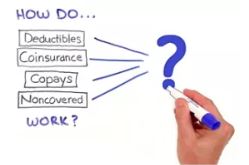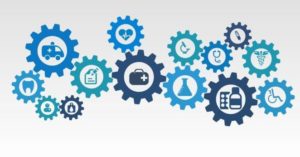Throughout 2018, Hollis Cobb representatives and managers have found that often the terminology on both healthcare statements and explanations of benefits confuses patients. In order to equip our staff to provide maximum assistance to the patient populations with whom we work nationwide, our training department has enhanced the continuing education provided to Hollis Cobb employees. Trainers are now specifically addressing the areas in which patients seem to be most confused, and are training our staff to, not only collect money, but to explain to patients why the money is owed.
 Many times patients do not understand the difference between co-insurance and co-pay. They tend to recognize co-pays as the amount paid at the time of service, but forget that their insurance plans may include a co-insurance amount, or cost sharing for health services, which is a percentage due from the patient after the deductible is paid.
Many times patients do not understand the difference between co-insurance and co-pay. They tend to recognize co-pays as the amount paid at the time of service, but forget that their insurance plans may include a co-insurance amount, or cost sharing for health services, which is a percentage due from the patient after the deductible is paid.
Patients do not always realize how high their deductibles are. They focus on their monthly premiums, but until they have a surgery or other high cost procedure, they do not realize how difficult it can be to pay the entire deductible at one time. Additionally, patients tend to be uncertain about the difference between a deductible and out-of-pocket maximum. They sometimes do not realize that the deductible may not be one amount for the entire family, but an amount per person, until the family reaches the out-of-pocket maximum.
Elderly patients can be particularly confused about what Medicare Parts A, B, C and D cover. Our training staff has taught Hollis Cobb representatives how to explain to patients that Medicare A primarily covers inpatient hospital stays, B covers labs and physician charges, Medicare C plans combine hospital, physician and sometimes drugs, and D is for prescription coverage.
 Our staff has learned how to explain these healthcare terms to patients in language they can easily comprehend. Once patients understand what and why they owe a balance, they are more likely to pay or set up a payment plan. It is vital that patients understand why they owe a balance and what it is for, as even collections is part of the total patient experience.
Our staff has learned how to explain these healthcare terms to patients in language they can easily comprehend. Once patients understand what and why they owe a balance, they are more likely to pay or set up a payment plan. It is vital that patients understand why they owe a balance and what it is for, as even collections is part of the total patient experience.
The Hollis Cobb Training Department is constantly reviewing patient calls, coaching representatives and looking for ways to provide the best possible service to our clients and the patients they serve.

